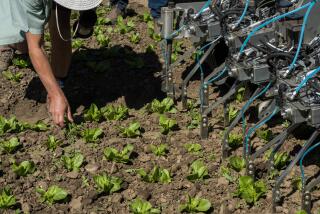Farming grows on a new generation
- Share via
In the last decade, technology has reshaped industries and redefined the very nature of work for many Americans. Yet even as the world has shifted, some jobs remain unaffected. In honor of Labor Day, we asked writers from four different fields to discuss how their fields have -- or have not -- changed.
--
The mechanization of farming, which has been chugging along for about 200 years, continues in its slow and irregular way. A few crops -- blueberries, olives, pomegranates -- have recently been added to the list of those that can be harvested by a machine instead of by human hand. A few tractors have been rigged with steering that is guided by satellites. But for the most part, the technological revolution that has affected so many other professions has bypassed farming.
This is not because there aren’t clever people working on farming technology or because farmers are too conservative to adopt new devices. Rather, it is because the marginal economic advantage of new technologies in farming hardly ever justifies the cost. There are just too many wild cards in this game. We are dealing with living organisms -- crops and livestock -- and complex ecosystems that behave in unpredictable ways. And on top of that, weather constantly makes a mockery of our plans. Usually, the best that new technology can promise is a slight advantage, often at rather a large cost. There is no penalty for sticking with the old ways. On the farm, the technology of 1960 still works well.
If farming has been overlooked by the computer revolution, it also has been spared from the disintegrating economy. Prices for farm products remain strong: People may lose their homes to foreclosure, but they continue to eat.
As to the daily labor of planting and harvesting, little has changed on my farm in the last few decades, with one exception. I still get up each morning at 5 o’clock, pull on my boots and walk out to the orchard to repair the irrigation where coyotes have chewed holes in it during the night. I still curse the descendants of the gophers I cursed 30 years ago. I still await the first apricot of the season, the first fig, the first melon, the first mandarin, and it is never a disappointment. I still harvest olives in December, mandarins in January and tulips (an unusual but profitable crop) in March; I prune my apricot trees in February and tend irrigation through the dry seasons. The pace is set by the annual cycle of weather and sunlight, and there is no possibility of accelerating it.
The one change is this: Recently, I have been getting two or three phone calls a week from young people wanting to serve an apprenticeship on my farm. I used to get such a call maybe once in five years. This increased interest must be due in part to the dismal job market, but it also seems that there is a generation coming of age that recognizes the attractions of cyberspace as fraudulent. The would-be farmers prefer to inhabit the world of authentic reality rather than imaginary reality. In farming they see a satisfying and worthy occupation in which you can wear comfortable old clothes, work under the open sky at interesting physical labor and produce something wonderful and useful. Probably they won’t get rich, but they won’t get a pink slip either. These days, that’s pretty attractive.
More to Read
Inside the business of entertainment
The Wide Shot brings you news, analysis and insights on everything from streaming wars to production — and what it all means for the future.
You may occasionally receive promotional content from the Los Angeles Times.








